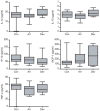Natural selection of human embryos: decidualizing endometrial stromal cells serve as sensors of embryo quality upon implantation
- PMID: 20422011
- PMCID: PMC2858159
- DOI: 10.1371/journal.pone.0010258
Natural selection of human embryos: decidualizing endometrial stromal cells serve as sensors of embryo quality upon implantation
Abstract
Background: Pregnancy is widely viewed as dependent upon an intimate dialogue, mediated by locally secreted factors between a developmentally competent embryo and a receptive endometrium. Reproductive success in humans is however limited, largely because of the high prevalence of chromosomally abnormal preimplantation embryos. Moreover, the transient period of endometrial receptivity in humans uniquely coincides with differentiation of endometrial stromal cells (ESCs) into highly specialized decidual cells, which in the absence of pregnancy invariably triggers menstruation. The role of cyclic decidualization of the endometrium in the implantation process and the nature of the decidual cytokines and growth factors that mediate the crosstalk with the embryo are unknown.
Methodology/principal findings: We employed a human co-culture model, consisting of decidualizing ESCs and single hatched blastocysts, to identify the soluble factors involved in implantation. Over the 3-day co-culture period, approximately 75% of embryos arrested whereas the remainder showed normal development. The levels of 14 implantation factors secreted by the stromal cells were determined by multiplex immunoassay. Surprisingly, the presence of a developing embryo had no significant effect on decidual secretions, apart from a modest reduction in IL-5 levels. In contrast, arresting embryos triggered a strong response, characterized by selective inhibition of IL-1beta, -6, -10, -17, -18, eotaxin, and HB-EGF secretion. Co-cultures were repeated with undifferentiated ESCs but none of the secreted cytokines were affected by the presence of a developing or arresting embryo.
Conclusions: Human ESCs become biosensors of embryo quality upon differentiation into decidual cells. In view of the high incidence of gross chromosomal errors in human preimplantation embryos, cyclic decidualization followed by menstrual shedding may represent a mechanism of natural embryo selection that limits maternal investment in developmentally impaired pregnancies.
Conflict of interest statement
Figures




References
-
- Dey SK, Lim H, Das SK, Reese J, Paria BC, et al. Molecular cues to implantation. Endocr Rev. 2004;25:341–373. - PubMed
-
- Wilcox AJ, Baird DD, Weinberg CR. Time of implantation of the conceptus and loss of pregnancy. N Engl J Med. 1999;340:1796–1799. - PubMed
-
- Brosens JJ, Parker MG, McIndoe A, Pijnenborg R, Brosens IA. A role for menstruation in preconditioning the uterus for successful pregnancy. Am J Obstet Gynecol. 2009;200:615–616. - PubMed
-
- Brosens JJ, Pijnenborg R, Brosens IA. The myometrial junctional zone spiral arteries in normal and abnormal pregnancies: a review of the literature. Am J Obstet Gynecol. 2002;187:1416–1423. - PubMed
-
- Evers JL. Female subfertility. Lancet. 2002;360:151–159. - PubMed
Publication types
MeSH terms
Grants and funding
LinkOut - more resources
Full Text Sources
Other Literature Sources

